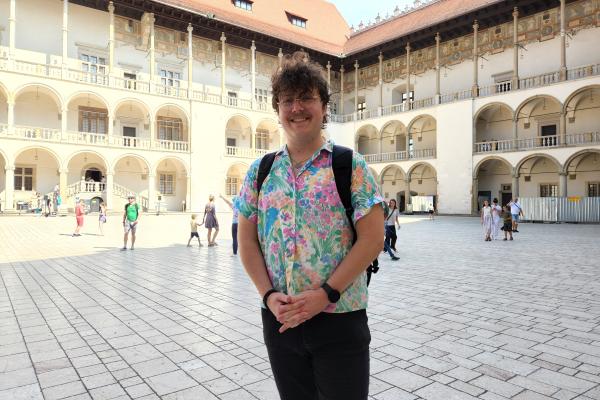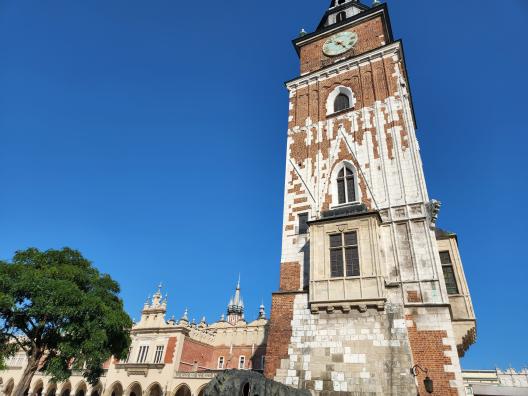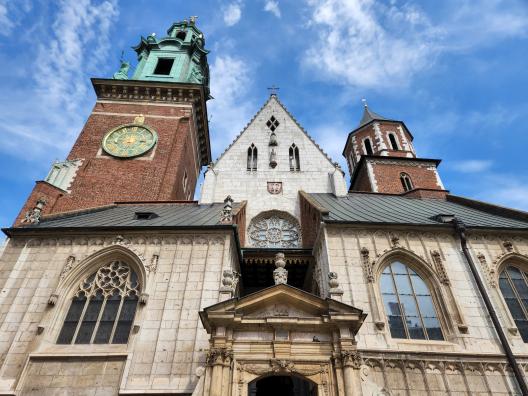Building Connections for an Equitable Future: Joe Ernst's Summer Abroad in Poland

Written by Joe Ernst
Joe Ernst is third-year MA student pursuing a dual-degree in Slavic, East European and Eurasian Studies and Public Affairs. In 2020, Joe received his BA from Ohio State in human resources and Russian. His primary research interests focus on LGBTQ+ and intersectional activism in Poland.
While COVID-19 and the outbreak of war in Ukraine have made travel to Central and East Europe more difficult over the past several years, the faculty and staff at CSEEES always amaze me with their dedication to making learning opportunities available and accessible to their students. Although my original plans of studying through the University of Pittsburgh were canceled due to the Russian invasion of Ukraine, I utilized the funds awarded to me through the Polish Studies Initiative’s scholarship competition to plan a trip to Poland in July and August of 2022.
As my thesis project focuses on LGBTQ+ and intersectional activism in Poland, I reached out to several non-profit organizations that operate in Poland to see if I could offer my language skills and academic interests to help further their activist efforts. Federacja Znaki Równości (Signs of Equality Federation) said that they would love to have me spend time with them at their community center in Kraków, called DomEQ. At this center, activists provide a variety of resources for LGBTQ+ youth and adults in the city, as well as for any people visiting or in need of a safe space. From putting on Queer Theater events on Friday evenings, to Polish lessons for Ukrainian refugees, I was able to see firsthand how the Polish LGBTQ+ community seeks to lift up their friends and neighbors.

Znaki Równości asked me to translate the first LGBTQ+ online store in Poland from Polish to English, and this was extremely useful in learning both where my language skills were and getting familiar with the practical application of translation. This experience helped me learn that written translation is something I really enjoy and want to pursue in the future. Many of the guests at the community center were eager to speak with me and this was a wonderful chance for me to practice my Polish, learning many colloquial phrases and slang. The young people there were happy to have a chance to practice their English with a native speaker and loved to give me their impressions regarding the state of LGBTQ+ activism and rights in Poland. Cultural exchanges such as these make time in the region so precious, and I made friendships that will last a lifetime.
Znaki also invited me to attend an international conference of activist organizations in Bratislava called East Meets West, where I was able to network with queer organizers from many different sub-interests and fields. Here I learned a great deal that will contribute to my thesis project, as networking and interviews are a key part of making sure voices from the region take a leading role in building an understanding of queer identity and lived realities. Two speakers who really stood out to me were activist-emigres from Belarus and Russia. Not only did I learn a great deal about queer activism under authoritarian governments, where communication and resource organization take on completely different modes than in Western countries, but these activists gave me insight into the challenges emigres face as activists when they are outside the communities which they seek to help. For example, simple things such as using specific apps for communication or speaking candidly in public spaces can make the difference between the police knowing what you are doing and being there to break up an action. For me this helped underscore one of the key elements of my research: making sure local understandings of activism, identity, and goals for the future are not subject to the political or personal biases of those of us in the West who seek to work with and aid movements in Central and East Europe.

In Kraków I was able to meet with many activists form the political sphere as well, in particular, union organizers, feminists, and even anti-establishment leftists. Through conversations at pubs and cafes I was able to delve into how Polish activists perceive the current political climate in the European Union and in Poland as we spoke about the current shortcomings of local activism in creating lasting and meaningful change for workers and minorities in Poland.
While I did enhance my connection to both the Polish language and culture, my experience in spending time with the Ukrainian refugees in Kraków helped bring home the reality many people face right now in these troubled times. The bravery and perseverance of my Ukrainian friends touched my soul and ought to be an inspiration to all of us who care about the people, places, and cultures in this region. While we study here at Ohio State, it is important to remember the human connections that make our academics possible. The more we can focus on building and sustaining connections between us and the people of this region, the more we will benefit from their experiences and insights. Summer 2022 made a deep impact on me for many reasons, but most of all I feel reinvigorated in my desire to contribute to making the world a more connected, rich, and ultimately better place.
